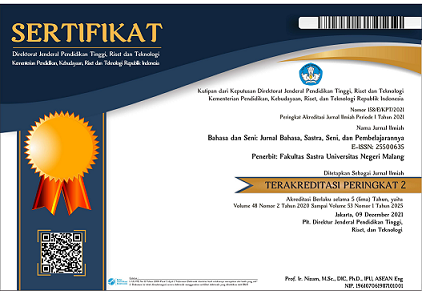Bicultural, personality, and pedagogical competences in the perspective of BIPA language assistants
Abstract
Bicultural, personality, and pedagogical competences in the perspective of BIPA language assistants
In 2019, there were 63.022 learners of Indonesian as a foreign language in Victorian schools, Australia. They were facilitated by 263 Indonesian Language for Foreign Speakers (BIPA) local teachers. Due to a shortage of BIPA local teachers, the Department of Education and Training Victoria had recruited language assistants from Indonesia. This study is aimed to describe the required skillsets of BIPA language assistants to support their duties. The data were collected through interviews, an inventory, observations, and stories of eight Indonesian language assistants with one year of experience. The findings reveal that the language assistants need to develop bicultural, personality and pedagogical competences. These competences should become the reference for developing workshop materials for future BIPA language assistants.
Keywords: BIPA teachers, bicultural competences, personality competences, pedagogical competences
Kompetensi bikultural, kepribadian, dan pedagogik dalam perspektif guru bantu BIPA
Pada tahun 2019 terdapat 63.022 siswa Victoria, Australia, yang mempelajari bahasa Indonesia sebagai bahasa asing. Mereka dibimbing oleh 263 guru BIPA. Karena jumlah guru tidak memadai, maka Department of Education and Training Victoria merekrut guru bantu (language assistant) dari Indonesia. Penelitian ini bertujuan untuk mendeskripsikan berbagai kompetensi yang perlu dimiliki guru bantu untuk menunjang pelaksanaan tugasnya. Data dikumpulkan dari wawancara, inventori, observasi, dan deskripsi pengalaman dari delapan guru bantu selama satu tahun mengajar. Hasil penelitian menunjukkan bahwa guru bantu perlu mengembangkan kompetensi bikultural, kompetensi kepribadian, dan kompetensi pedagogik. Ketiga kompetensi ini sebaiknya dijadikan bahan workshop pada pembekalan guru bantu di lembaga pengirim.
Kata kunci: guru BIPA, kompetensi bikultural, kompetensi kepribadian, kompetensi pedagogik
Full Text:
PDFReferences
Adebayo, C. T. & Allen, M. (2020). The Experiences of international teaching assistants in the US classroom. Journal of International Students. 10(1), 69–83.
An-Naqah, M. K. (1997). Al-Barnamij at-ta’limy al-qaìm álal kafaàat. Fakultas Pendidikan, Universitas Ainusy Syams.
Erumit, B. A, Akerson, V. L., & Buck, G. A. (2021). Multiculturalism in higher education: Experiences of international teaching assistants and their students in science and math classrooms. Cultural Studies of Science Education, 16(1), 251–278.
Guilherme, M. (2000). Intercultural competence. In, M. S. Byram (Ed.), M. Routledge Encyclopedia of Language Teaching and Learning (pp. 298–300). Routledge Taylor and Francis Group.
Hardini, T. I., Setyarini, S., & Harto, S. (2019). Indonesian language assistant program in Australian Schools: Recruitment and selection process. Jurnal Cakrawala Pendidikan, 38(2), 330–342.
Huang, Y. (2014). Constructing intercultural communicative competence framework for English learners. Cross-Cultural Communication, 10(1), 97–101.
Lehman, C. (2020). Teaching assistants in international schools: Perceptions and perspectives. Beyond Words, 8(1), 47–59.
Liddicoat, A. J. (2009). Communication as culturally contexted practice: A view from intercultural communication. Australian Journal of Linguistics, 29(1), 115–133.
Littlewood, W. (1984). Foreign and second language learning: Language acquisition research and its implications for the classroom. Cambridge University Press
Luo, J., Bellows, L., & Grady, M. (2000). Classroom management issues for teaching assistants. Research in Higher Education, 41(3), 353–383.
Norris, T. (1991). Nonnative English-speaking teaching assistants and student performance. Research in Higher Education, 32(4), 433–448.
Paulston, C. B. (2005) Biculturalisme: Some reflections and speculations. In S.F. Kiesling (Ed.). Intercultural discourse and communication (pp. 277–287). Blackwell Publising.
Peacock, J. (1988). The anthropological lens: Harsh light, soft focus. Cambridge University Press.
Rinehart, N. (2002). Utalitarian or idealist? Frameworks for assessing the study abroad experience. In W. Grünzweig & N. Rinehart (Eds.), Rockin’ in Red Square: critical approaches to international education in the age of cyberculture (pp. 75–84). Lit Verlag.
Tarry, E. (2011). British International Schools: The deployment and training of teaching assistants. Journal of Research in International Education. 10(3), 293-302.
Tylor, S. E. B. (1871). Definition of culture. Public Domain.
Victoria Department of Education and Training (DET). (2020). Languages provision in Victorian Government Schools, 2019. Melbourne.
Yang, M., Webster, B., & Prosser, M. (2011). Travelling a thousand miles: Hong Kong Chinese students’ study abroad experience. International Journal of Intercultural Relations, 35(1), 69–78.
DOI: http://dx.doi.org/10.17977/um015v50i12022p63
Refbacks
- There are currently no refbacks.

This work is licensed under a Creative Commons Attribution 4.0 International License.

Dear Sir/Madam
We appreciate your continued confidence and trust in Bahasa dan Seni: Jurnal Bahasa, Sastra, Seni, dan Pengajarannya (JBS). In order to enhance the service, readability, and quality of JBS publications, we will be transitioning to a new website, https://citeus.um.ac.id/jbs, in collaboration with Digital Commons (Elsevier) starting in July 2024.
Sincerely
Yusuf Hanafi
(Editor in chief)















2.png)